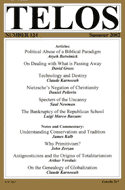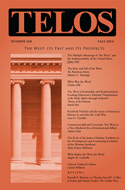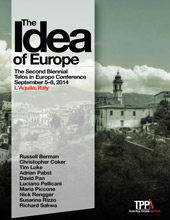By Joseph van der Naald · Tuesday, November 18, 2014  Is humanity’s need to control nature ultimately working against us? Are the modern ecological crises we face today the inevitable result of the accelerating technologization of society? Can we conclude that what appears to be widespread anomie, as evidenced, for example, by the now almost monthly school shootings in the United States, and the genocidal totalitarian regimes of the twentieth century both have their “premises, dynamics, or preconditions” (169) in industrialization’s alienation of mankind from nature? In “Why Primitivism?” John Zerzan hopes to convince us that the answers to these questions are yes. Through a nuanced critique of both modernity and the thoughts of the twentieth and twenty-first centuries’ canonized intellectual Left, Zerzan draws the conclusion that we should look far back into human pre-history to find solutions to the problems that face humanity in the present. In this post, I will explore the primitivist position and provide a critique of Zerzan’s thought using Slavoj Žižek’s explorations into ecology’s ideological character. Is humanity’s need to control nature ultimately working against us? Are the modern ecological crises we face today the inevitable result of the accelerating technologization of society? Can we conclude that what appears to be widespread anomie, as evidenced, for example, by the now almost monthly school shootings in the United States, and the genocidal totalitarian regimes of the twentieth century both have their “premises, dynamics, or preconditions” (169) in industrialization’s alienation of mankind from nature? In “Why Primitivism?” John Zerzan hopes to convince us that the answers to these questions are yes. Through a nuanced critique of both modernity and the thoughts of the twentieth and twenty-first centuries’ canonized intellectual Left, Zerzan draws the conclusion that we should look far back into human pre-history to find solutions to the problems that face humanity in the present. In this post, I will explore the primitivist position and provide a critique of Zerzan’s thought using Slavoj Žižek’s explorations into ecology’s ideological character.
Continue reading →
By Telos Press · Monday, November 17, 2014 On The Agenda with Steve Paikin, Telos Associate Editor Adrian Pabst and others discuss the transformation of Germany since the Fall of the Berlin Wall, which took place twenty-five years ago this month, as well as Germany’s future as a dominant political and economic force in Europe.
Continue reading →
By Angelo M. Codevilla · Monday, November 17, 2014 Angelo M. Codevilla’s “What Makes the West the West?” appears in Telos 168 (Fall 2014). Read the full version online at the Telos Online website, or purchase a print copy of the issue in our store.
 The intellectual-moral propositions that make the West the West are particular and exclusive to our civilization. They are indefensible, incomprehensible nonsense except in terms of Jerusalem and Athens. The ideas that distinguish the West’s forma mentis follow from the Biblical teaching that God created the universe by and through logos. This beckons our reason. The charter of human equality and freedom, unique to the West, is the Biblical teaching that man is created in the image and likeness of God. The West’s distinctiveness follows as well from Parmenides of Elea’s distinction between opinions and the truth of “the things that are.” This empowered human reason to access the logos of the universe. Consequently, reason distinguished between positive law—what is right by human will—and what is right by nature—natural law. The intellectual-moral propositions that make the West the West are particular and exclusive to our civilization. They are indefensible, incomprehensible nonsense except in terms of Jerusalem and Athens. The ideas that distinguish the West’s forma mentis follow from the Biblical teaching that God created the universe by and through logos. This beckons our reason. The charter of human equality and freedom, unique to the West, is the Biblical teaching that man is created in the image and likeness of God. The West’s distinctiveness follows as well from Parmenides of Elea’s distinction between opinions and the truth of “the things that are.” This empowered human reason to access the logos of the universe. Consequently, reason distinguished between positive law—what is right by human will—and what is right by nature—natural law.
Continue reading →
By Telos Press · Wednesday, November 12, 2014 Speaking at the 2014 Telos in Europe Conference, Neil Turnbull considers the prospects for the European project as we move from the Westphalian age of nation-states to a new age of empires. What kind of empire is now emerging in Europe, and what form will it take in the future?
Continue reading →
By Eduardo Sabrovsky · Saturday, November 8, 2014  I thank very much the organizers for this opportunity to discuss “The Idea of Europe.” Among the several specific topics for discussion suggested in the conference outline, my paper will address the question: “Universalism or exceptionalism?” Now, in the context of this conference, this question might be understood either in historical-political or in philosophical terms, or somehow in both. And it is my contention that, in “the Idea of Europe” the historical-political and the philosophical as such substantially converge. In other words, in “the idea,” with its philosophical complexities, we should be able to find the trace of the decisive rupture in historical time—event, exception—that gave rise to modern Europe and conferred a particular direction, a primordial bias to its temporal unfolding; a bias not opposed to modern reason’s universalism, and inherently beyond the reach of its critical powers. I thank very much the organizers for this opportunity to discuss “The Idea of Europe.” Among the several specific topics for discussion suggested in the conference outline, my paper will address the question: “Universalism or exceptionalism?” Now, in the context of this conference, this question might be understood either in historical-political or in philosophical terms, or somehow in both. And it is my contention that, in “the Idea of Europe” the historical-political and the philosophical as such substantially converge. In other words, in “the idea,” with its philosophical complexities, we should be able to find the trace of the decisive rupture in historical time—event, exception—that gave rise to modern Europe and conferred a particular direction, a primordial bias to its temporal unfolding; a bias not opposed to modern reason’s universalism, and inherently beyond the reach of its critical powers.
Continue reading →
By Telos Press · Friday, November 7, 2014 In this video from the 2014 Telos in Europe Conference, Phillip Blond of ResPublica proposes that the future stability of representative democracy, particularly in Europe, depends upon a new understanding of universals that would provide the basis of the good.
Continue reading →
|
|
 Is humanity’s need to control nature ultimately working against us? Are the modern ecological crises we face today the inevitable result of the accelerating technologization of society? Can we conclude that what appears to be widespread anomie, as evidenced, for example, by the now almost monthly school shootings in the United States, and the genocidal totalitarian regimes of the twentieth century both have their “premises, dynamics, or preconditions” (169) in industrialization’s alienation of mankind from nature? In “Why Primitivism?” John Zerzan hopes to convince us that the answers to these questions are yes. Through a nuanced critique of both modernity and the thoughts of the twentieth and twenty-first centuries’ canonized intellectual Left, Zerzan draws the conclusion that we should look far back into human pre-history to find solutions to the problems that face humanity in the present. In this post, I will explore the primitivist position and provide a critique of Zerzan’s thought using Slavoj Žižek’s explorations into ecology’s ideological character.
Is humanity’s need to control nature ultimately working against us? Are the modern ecological crises we face today the inevitable result of the accelerating technologization of society? Can we conclude that what appears to be widespread anomie, as evidenced, for example, by the now almost monthly school shootings in the United States, and the genocidal totalitarian regimes of the twentieth century both have their “premises, dynamics, or preconditions” (169) in industrialization’s alienation of mankind from nature? In “Why Primitivism?” John Zerzan hopes to convince us that the answers to these questions are yes. Through a nuanced critique of both modernity and the thoughts of the twentieth and twenty-first centuries’ canonized intellectual Left, Zerzan draws the conclusion that we should look far back into human pre-history to find solutions to the problems that face humanity in the present. In this post, I will explore the primitivist position and provide a critique of Zerzan’s thought using Slavoj Žižek’s explorations into ecology’s ideological character.  The intellectual-moral propositions that make the West the West are particular and exclusive to our civilization. They are indefensible, incomprehensible nonsense except in terms of Jerusalem and Athens. The ideas that distinguish the West’s forma mentis follow from the Biblical teaching that God created the universe by and through logos. This beckons our reason. The charter of human equality and freedom, unique to the West, is the Biblical teaching that man is created in the image and likeness of God. The West’s distinctiveness follows as well from Parmenides of Elea’s distinction between opinions and the truth of “the things that are.” This empowered human reason to access the logos of the universe. Consequently, reason distinguished between positive law—what is right by human will—and what is right by nature—natural law.
The intellectual-moral propositions that make the West the West are particular and exclusive to our civilization. They are indefensible, incomprehensible nonsense except in terms of Jerusalem and Athens. The ideas that distinguish the West’s forma mentis follow from the Biblical teaching that God created the universe by and through logos. This beckons our reason. The charter of human equality and freedom, unique to the West, is the Biblical teaching that man is created in the image and likeness of God. The West’s distinctiveness follows as well from Parmenides of Elea’s distinction between opinions and the truth of “the things that are.” This empowered human reason to access the logos of the universe. Consequently, reason distinguished between positive law—what is right by human will—and what is right by nature—natural law.  I thank very much the organizers for this opportunity to discuss “The Idea of Europe.” Among the several specific topics for discussion suggested in the conference outline, my paper will address the question: “Universalism or exceptionalism?” Now, in the context of this conference, this question might be understood either in historical-political or in philosophical terms, or somehow in both. And it is my contention that, in “the Idea of Europe” the historical-political and the philosophical as such substantially converge. In other words, in “the idea,” with its philosophical complexities, we should be able to find the trace of the decisive rupture in historical time—event, exception—that gave rise to modern Europe and conferred a particular direction, a primordial bias to its temporal unfolding; a bias not opposed to modern reason’s universalism, and inherently beyond the reach of its critical powers.
I thank very much the organizers for this opportunity to discuss “The Idea of Europe.” Among the several specific topics for discussion suggested in the conference outline, my paper will address the question: “Universalism or exceptionalism?” Now, in the context of this conference, this question might be understood either in historical-political or in philosophical terms, or somehow in both. And it is my contention that, in “the Idea of Europe” the historical-political and the philosophical as such substantially converge. In other words, in “the idea,” with its philosophical complexities, we should be able to find the trace of the decisive rupture in historical time—event, exception—that gave rise to modern Europe and conferred a particular direction, a primordial bias to its temporal unfolding; a bias not opposed to modern reason’s universalism, and inherently beyond the reach of its critical powers. 

